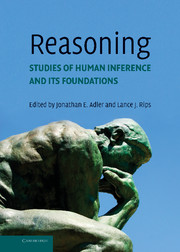1 - Change in View: Principles of Reasoning
Published online by Cambridge University Press: 05 June 2012
Summary
BELIEF AND DEGREE OF BELIEF
Probabilistic Implication
We have a rule connecting implication and reasoning:
Principle of Immediate Implication That P is immediately implied by things one believes can be a reason to believe P.
Is there also a weaker probabilistic version of this rule?
Hypothetical Principle of Immediate Probabilistic Implication That P is obviously highly probable, given one's beliefs, can be a reason to believe P.
Suppose Mary purchases a ticket in the state lottery. Given her beliefs, it is obviously highly probable that her ticket will not be one of the winning tickets. Can she infer that her ticket will not win? Is she justified in believing her ticket is not one of the winning tickets?
Intuitions waver here. On the one hand, if Mary is justified in believing her ticket is not one of the winning tickets, how can she be justified in buying the ticket in the first place? Furthermore, it certainly seems wrong to say she can know that her ticket is not one of the winning tickets if it is really a fair lottery. On the other hand the probability that the ticket is not one of the winning tickets seems higher than the probability of other things we might easily say Mary knows. We ordinarily allow that Mary can come to know various things by reading about them in the newspaper, even though we are aware that newspapers sometimes get even important stories wrong.
Information
- Type
- Chapter
- Information
- ReasoningStudies of Human Inference and its Foundations, pp. 35 - 46Publisher: Cambridge University PressPrint publication year: 2008
References
Accessibility standard: Unknown
Why this information is here
This section outlines the accessibility features of this content - including support for screen readers, full keyboard navigation and high-contrast display options. This may not be relevant for you.Accessibility Information
- 8
- Cited by
